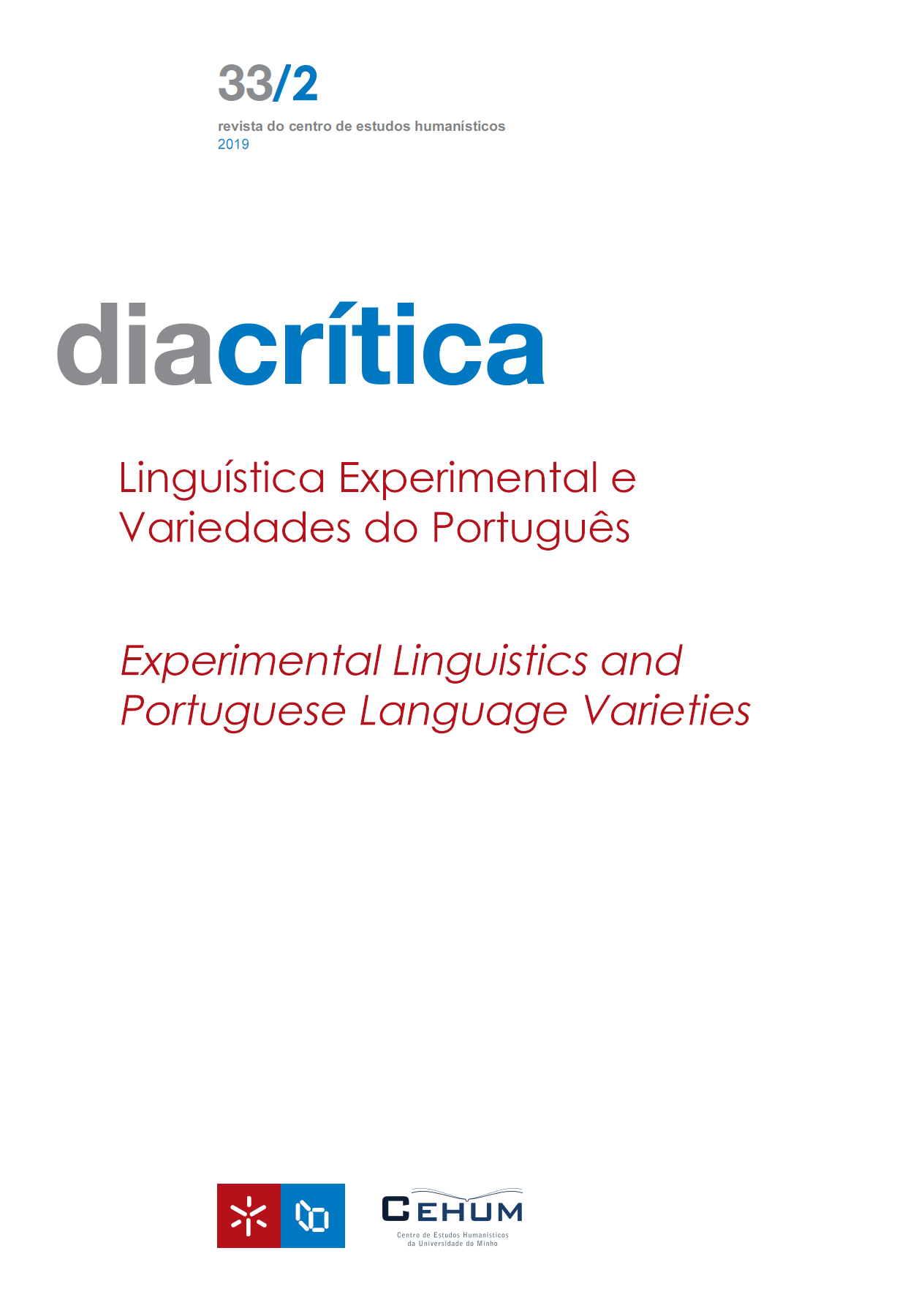A influência da referencialidade, da definitude e da contração preposição+determinante no processamento de orações relativas
DOI:
https://doi.org/10.21814/diacritica.5057Palavras-chave:
Processamento de orações relativas, Referencialidade, Contração preposição determinante, Definitude, Português brasileiro, EspanholResumo
Neste artigo, apresentamos dois experimentos (questionários) que conduzimos para investigar a influência da referencialidade, da definitude e da contração preposição+determinante (contração P+D) no processamento de orações relativas. O primeiro experimento foi conduzido em português brasileiro e os resultados revelaram um efeito significativo da referencialidade e da definitude: a modificação do N2 (aposição local) foi mais observada quando o N2 era referencial e quando ele era introduzido por artigo indefinido. Os resultados não revelaram, porém, efeito da contração P+D. O segundo experimento foi conduzido em espanhol e focalizou a referencialidade e a contração P+D. Os resultados revelaram um efeito significativo dos dois fatores: a modificação do N2 foi mais observada quando o N2 era referencial e quando o artigo que o precedia não envolvia contração com a preposição. Com esses resultados, enfatizamos a influência dos três fatores investigados na interpretação de orações relativas, destacando a originalidade do efeito da contração P+D.
Referências
Aguilar-Guevara, A. (2014). Weak definites: Semantics, lexicon and pragmatics(Doctoral thesis, Utrecht University, Utrecht, Netherlands).
Bezerra, G. B. (2017). A influência da referencialidade no processamento de orações relativas associadas a NPs complexos do tipo “substância”(Doctoral thesis, Federal University ofParaíba, João Pessoa, Brasil).
Bezerra, G. B., Leitão, M. & Medeiros, L. (2017). A influência da referencialidade no processamento de orações relativas em português brasileiro. Revista de Estudos da Linguagem, 25(3), 1397–1431. https://doi.org/10.17851/2237-2083.25.3.1397-1431
Bezerra, G. B. & Leitão, M. M. (2017). The construal hypothesis and relative clause processing: The effect of the referentiality principle in Brazilian Portuguese. In L. Escobar,V. Torrens&T. Parodi (Eds.), Language processing and disorders(pp. 54–74). Newcastle upon Tyne: Cambridge Scholars Publishing.
Carreiras, M. & Clifton, C. (1999). Another word on parsing relative clauses: Eyetracking evidence from Spanish and English. Memory & Cognition, 27(5), 826–833.
Chierchia, G. (1998). Reference to kinds across languages. Natural Language Semantics, 6(4), 339–405.
Crain, S. & Steedman, M. (1985). On not being led up the garden path: The use of context by the psychological parser. In D. Dowty, L. Kartunnen & H. Zwicky (Eds.), Natural language parsing(pp. 320–358). Cambridge, UK: Cambridge University Press.https://doi.org/10.1017/CBO9780511597855.011
Cuetos, F. & Mitchell, D. C. (1988). Cross-linguistic differences in parsing: Restrictions on the use of the late closure strategy in Spanish. Cognition, 30, 73–105. https://doi.org/10.1016/0010-0277(88)90004-2
Fodor, J. D. (1998). Learning to parse?.Journal of Psycholinguistic Research, 27(2), 285–319. https://doi.org/10.1023/A:1023258301588
Frazier, L. (1979). On comprehending sentences: Syntactic parsing strategies(Unpublished doctoral thesis, University of Connecticut, Connecticut, USA).
Frazier, L. (1990). Exploring the architecture of the language-processing system. In G. Altmann (Ed.), Cognitive models of speech processing: Psycholinguistic and computational perspectives(pp. 409–433). Cambridge, MA: MIT Press.
Frazier, L. & Clifton, C. Jr. (1996). Construal. Cambridge, MA: MIT Press Cambridge.
Frazier, L. & Rayner, K. (1982). Making and correcting errors during sentence comprehension: Eye movements in the analysis of structurally ambiguous sentences. Cognitive Psychology, 14(2), 178–210. https://doi.org/10.1016/0010-0285(82)90008-1
Gilboy, E., Sopena, J., Clifton, C. Jr. & Frazier, L. (1995). Argument structure and association preferences in Spanish and English complex NPs. Cognition, 54(2), 131–167. https://doi.org/10.1016/0010-0277(94)00636-Y
Gibson, E., Pearlmutter, N., Canseco-Gonzalez, E. & Hickok, G. (1996). Recency preference in the human sentence processing mechanism. Cognition, 59, 23–59. https://doi.org/10.1016/0010-0277(95)00687-7
Grillo, N. & Costa, J. (2014). A novel argument for the universality of parsing principles. Cognition, 133, 156–187. https://doi.org/10.1016/j.cognition.2014.05.019
Hemforth, B., Konieczny, L., Seelig, H. & Walter, M. (2000). Case matching and relative clause attachment. Journal of Psycholinguistic Research, 29, 81–88. https://doi.org/10.1023/A:1005176507878
Hofherr, P.C.(2012). Preposition-determiner portmanteaux in French and German. In P. Ackema, R. Alcorn, C. Heycock, D. Jaspers, J. Van Craenenbroeck&G. Wyngaerd (Eds.), Comparative germanic syntax: The state of the art(pp. 99–132). Amsterdam: John Benjamins Publishing Company.
Maia, M. & Finger, I. (2007). Referencialidade e domínio temático na compreensão de orações relativas curtas e longas em português. Linguística, 3(2), 249–278.
Maia, M., Fernández, E. M., Costa, A. & Lourenço-Gomes, M. C. (2006). Early and late preferences in relative clause attachment in Portuguese and Spanish. Journal of Portuguese Linguistics, 6, 227–250. https://doi.org/10.5334/jpl.151
Mitchell, D. C. & Cuetos, F. (1991). The origins of parsing strategies. In C. Smith (Ed.), Current issues innatural language processing (pp. 1–12).Austin: University of Texas,.
Miyamoto, E. T. (1999). Relative clause processing in Brazilian Portuguese and Japanese(Doctoral thesis, Massachusetts Institute of Technology –MIT,Cambridge, UK).
Miyamoto, E. (2005). Orações relativas ambíguas e a homogeneidade do processamento de sentenças. In M. Maia & I. Finger (Eds.), Processamento da linguagem(pp. 71–90). Pelotas: Educat.
Nunes, J. (2008). Preposition insertion in the mapping from Spell-out to PF. In H. Broekhuis & R. Vogel (Eds.), Optimality theory and minimalism: Interface theories[Linguistics in Potsdam 28] (pp. 136–156). Potsdam: Universitätsverlag Potsdam.
Ribeiro. A. J. (1998). Um caso de não aplicação de Late Closure no português do Brasil. Riode Janeiro: UFRJ / FL. Mimeo.
Ribeiro. A. J. (2004). Late Closure em parsing no português do Brasil(Doctoral thesis, Federal University of Rio de Janeiro, Rio de Janeiro, Brazil).
Ribeiro. A. J. (2005). Late Closure em parsing no português do Brasil. In M. Maia& I. Finger(Eds.),Processamento da linguagem(pp. 51–70). Pelotas: Educat.
Schmitt, C. (2000). Some consequences of the complement analysis for relative clauses, demonstratives and the wrong adjectives. In A. Alexiadou,P. Law,A. Meinunger&C. Wilder (Eds.), The syntax of relative clauses (pp. 309–348). Amsterdam: John Benjamins.
Schwarz, F. (2009). Two types of definites in natural language(Doctoral thesis, University of Massachusetts, Amherst, USA).
Spivey-Knowlton, M. & Sedivy, J. C. (1995). Resolving attachment ambiguities with multiple constraints. Cognition, 55(3), 227–267. https://doi.org/10.1016/0010-0277(94)00647-4
Zagar, D., Pynte, J. & Rativeau, S. (1997). Evidence for early-closure attachment on first-pass reading times in French. The Quarterly Journal of Experimental Psychology, 50(2), 421–438. https://doi.org/10.1080/713755715
Downloads
Publicado
Como Citar
Edição
Secção
Licença
Direitos de Autor (c) 2023 Gitanna Brito Bezerra

Este trabalho encontra-se publicado com a Creative Commons Atribuição-NãoComercial 4.0.










